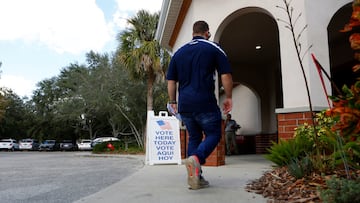Can ex-convicts vote on US Election 2024? It depends on what state they live in
For millions of Americans with felony convictions, their ability to participate in the democratic process will depend largely on where they call home.


The right of ex-convicts to vote in the 2024 US election varies significantly depending on the state they reside in. While progress has been made in recent years to restore voting rights to formerly incarcerated individuals, an estimated 4 million Americans with felony convictions will still be unable to cast their ballots.
In most states, ex-convicts face some restrictions on their voting rights, but the severity and duration of these limitations differ widely. At one end of the spectrum, states like Maine and Vermont allow all citizens to vote, regardless of their criminal history, even while they are still incarcerated.
On the other end, 10 states continue to deny voting rights to some ex-offenders who have completed their sentences, including prison time, probation, and parole. These are:
- Florida: Ex-convicts must pay all fines, fees, and restitution associated with their cases before they can vote.
- Wyoming: Only first-time, non-violent felony offenders have their voting rights automatically restored upon completion of their sentence. Those convicted of other felonies lose their right to vote permanently, unless pardoned.
- Virginia: As of March 2023, some people with felony convictions cannot vote. The automatic restoration of voting rights upon release from prison was reversed by Governor Youngkin.
- Oklahoma: Individuals convicted of a felony are ineligible to vote until the full term of their original sentence ends, including any parole and/or probation.
- Alabama, Arizona, Delaware, Iowa, Kentucky, Mississippi, Nebraska, Tennessee: These states have varying restrictions on voting rights for ex-convicts, which may include waiting periods, limitations based on the type of offense, or requirements for rights restoration applications.
Related stories
The impact of these laws is not evenly distributed across the population. Black and Latino communities are disproportionately affected by felony disenfranchisement, reflecting broader disparities in the criminal justice system. This has led to concerns about voter suppression and the fairness of elections in marginalized communities.
For ex-convicts unsure about their voting rights, resources are available to help navigate the complex landscape of state laws. Websites like RestoreYourVote.org provide state-specific information on voting eligibility and the process for rights restoration. However, experts caution that even election officials sometimes provide inaccurate information


Complete your personal details to comment